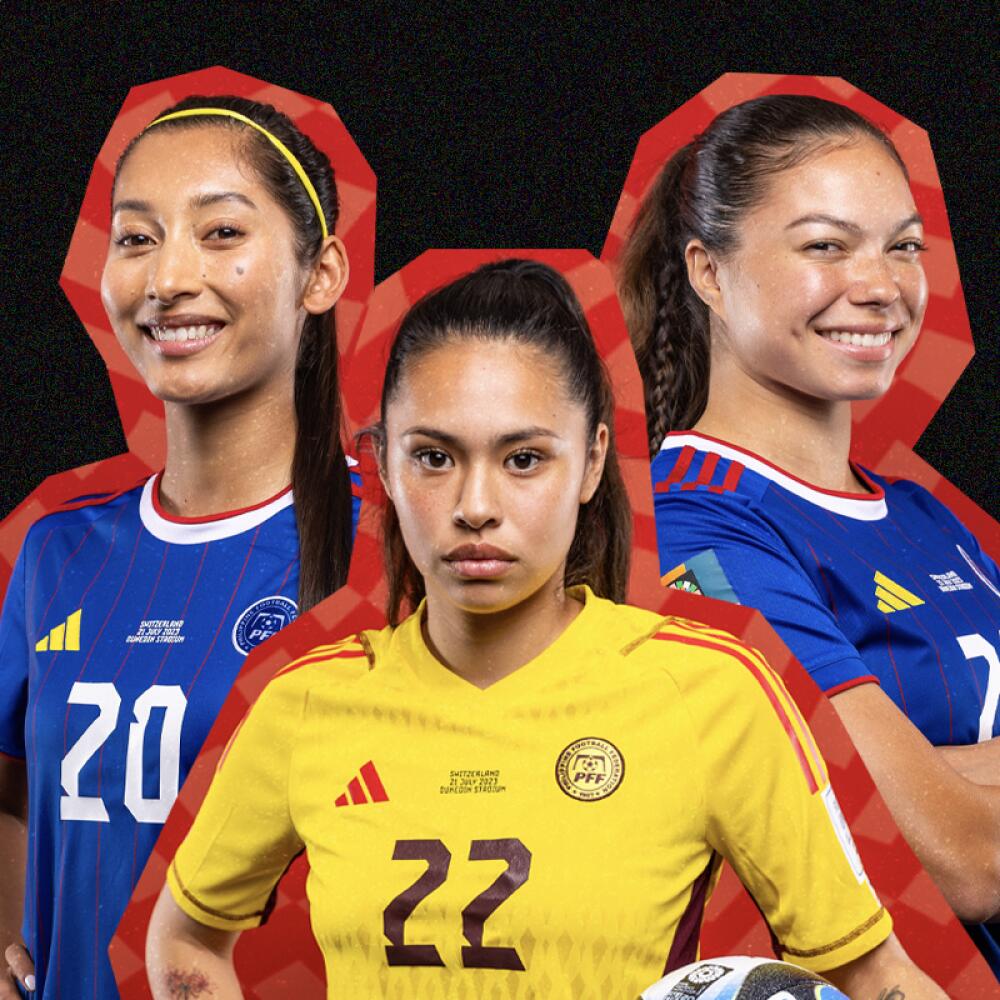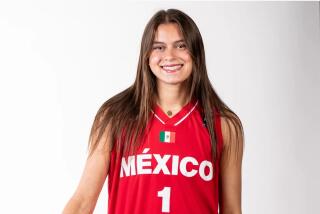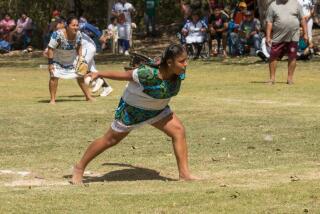
- Share via
The Fontanillas always dreamed of their daughter Kiara one day playing for Mexico or the United States in the World Cup. Never did they imagine she’d end up representing the Philippines, where soccer is still a growing sport.
“Seeing her on the biggest stage of the sport fills my heart with so much joy, happiness and pride,” said her mother, Fabiola Fontanilla, who was born in Tijuana and whose family is from the Mexican states of Jalisco and Oaxaca. “It tells me that all the time, effort, heartaches, soccer trainings, tournaments, bad and good days were totally worth it.”
Alyssa Thompson, who is half Peruvian, brings a dynamic approach to the U.S. team with her speed and grit.
“Her achievement for this very proud moment in history not only honors her Filipino heritage, but her Mexican side as well,” Fontanilla told De Los.
Of the 23 World Cup players representing the Philippines women’s national team, 18 were born in the U.S., and Kiara Fontanilla — a goalkeeper from Eastvale in the Inland Empire — is one of them. At least two other players also have Latin American heritage. It’s the Philippines’ first World Cup and the team has made history with its first ever win on Tuesday against the hosting team of New Zealand. The team now faces Norway on Sunday.
The squad has captured the hearts of many, with the players described as showing grit, pride and love “for a country that’s in their blood,” noted Yahoo Sports senior soccer reporter Henry Bushnell. After the team’s 2-0 loss to Switzerland in the group’s World Cup debut, head coach Alen Stajcic said he was proud of the team’s fighting spirit against players from Europe’s top leagues. The #LabanFilipinas hashtag has spread widely. Supermalls across the Philippines are hosting watch parties.
‘Language isn’t the only thing that defines who we are and our relationship to our Mexican heritage.’
Fontanilla’s Filipino heritage comes from her father, Frank Fontanilla, who was born in Baguio City. His family has roots in La Union and Pangasinan.
In an interview with Futbol Brew — a podcast following the Philippine Women’s Football team — Kiara recalled telling her father for the first time that she had made the national team. “His eyes lit up,” she said.
Kiara said she’d never seen her father cry until that moment. That day, she recalled she and her dad seeing two orange monarch butterflies, which she associates with her “Lolo” and “Lola,” her grandparents.
“I think that’s when my dad started crying,” she told Futbol Brew.
Another Philippines World Cup player with Mexican roots is Quinley Quezada, a midfielder from Rosemead who graduated from UC Riverside.
Quezada, whose mother is Filipina and whose father is Mexican, attended tryouts in California for the national team while a junior in college.
“Being part of the Philippines’ team was the first instance where I actually felt connected to my Filipino roots,” Quezada told Futbol Brew in an interview posted about a year ago.
Quezada said she grew up feeling more of a connection with her Mexican side since her grandmother from her dad’s side helped take care of her. “I would see my Filipino grandparents here and there, but I wasn’t with them constantly,” she said.
Playing for the Philippines helped her see the connection of “where my mom was from, where she grew up,” she told Futbol Brew.
For Reina Bonta — whose mother is Puerto Rican and whose father is Filipino American — playing for the Philippines means she’s “Wearing the jersey for my lola, dad, and the young girls watching in the Philippines who will be wearing it next,” she wrote on Instagram.
Her father is California Atty. Gen. Rob Bonta, who was born in Quezon City in the Philippines and immigrated as an infant to California with his family.
For the record:
8:38 a.m. July 31, 2023An earlier version of this article mistakenly paraphrased Assemblywoman Mia Bonta when she was talking about the background of her mother’s parents. Bonta was talking about the ancestry of many people in Puerto Rico.
Her mother is Assemblywoman Mia Bonta (D-Alameda), who identifies as Black and Latina. She talked about her ancestry to the Sacramento Observer earlier this year. “The history of Puerto Rico is that people like my folks came from Ghana, from West Africa, on Spanish slave ships and were deposited on one of their first stops before they got to the U.S. mainland, which was the Caribbean island of Puerto Rico,” she told the Sacramento Observer.
Mia Bonta described her daughter as a “Renaissance woman,” who “worked really hard” and “had to go to many combines to be considered.”
“I think for her, and for our family, it speaks to what it means to the ‘first of,’ ” she told Fox KTVU.
The Associated Press contributed to this report.
More to Read
The Latinx experience chronicled
Get the Latinx Files newsletter for stories that capture the multitudes within our communities.
You may occasionally receive promotional content from the Los Angeles Times.










